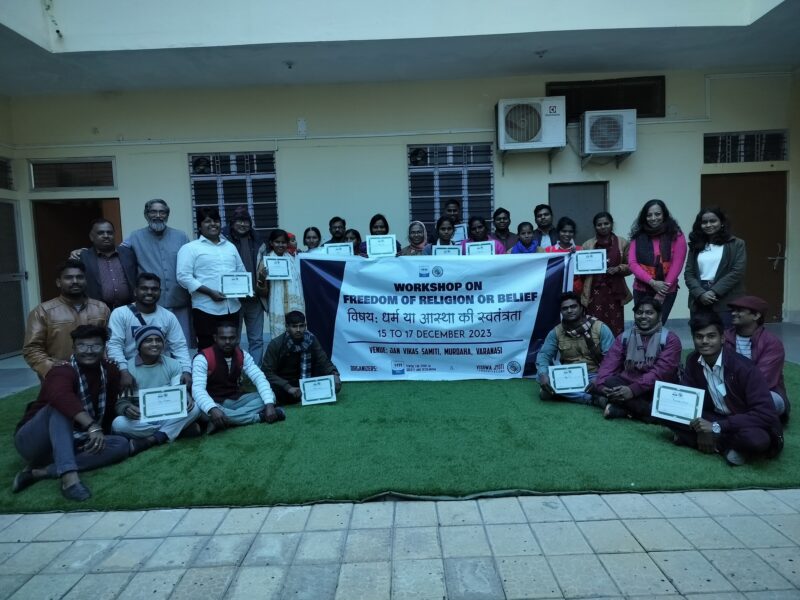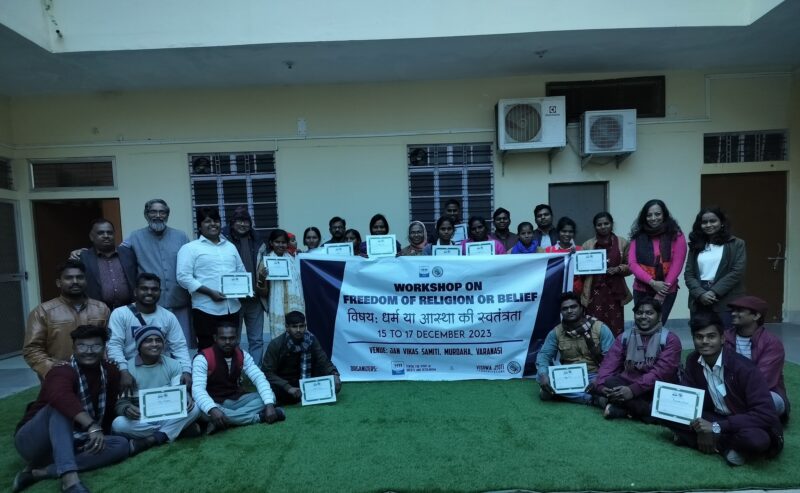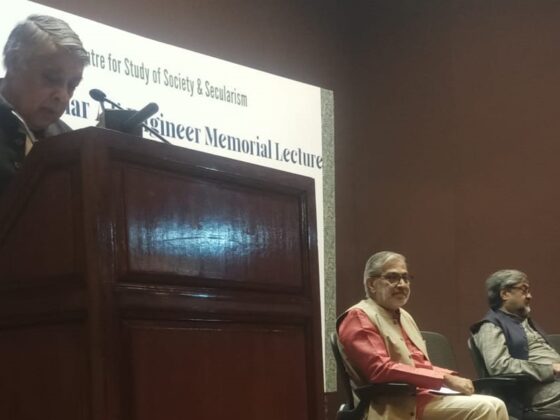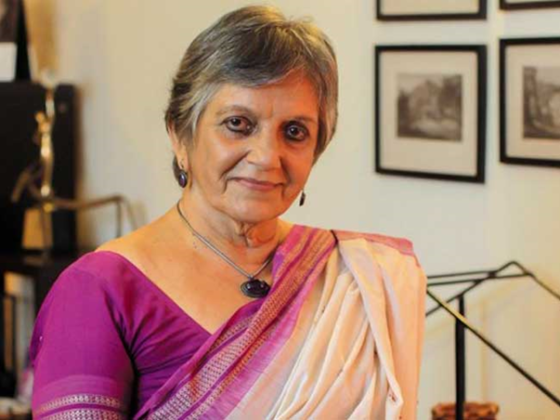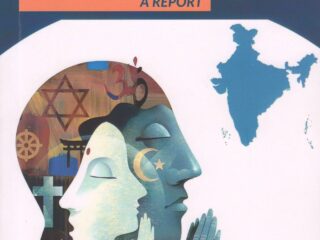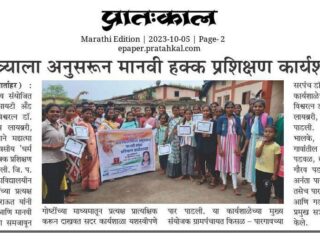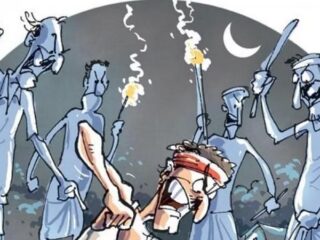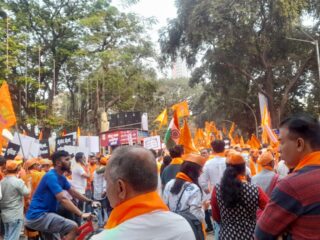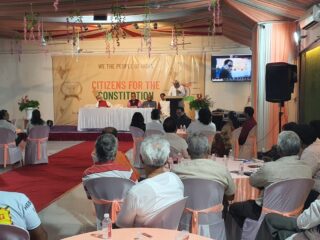Report of Workshop on “Freedom of Religion or Belief” held in Varanasi
26/12/2023
“This workshop helped me understand the prejudices I had against other communities and gave me an opportunity to introspect”, said Aradhana. Centre for Study of Society and Secularism in collaboration with Vishwa Jyoti Communication organized a three days’ workshop on freedom of religion or belief (forb) in Murdaha village in Varanasi, UP. Freedom of religion or belief is a salient right guaranteed in the Constitution of India as well as in international instruments of human rights including the Universal Declaration of Human Rights (UDHR). The workshop which was organized to promote better understanding of forb, witnessed the discussions on discriminatory attitudes prevalent in the society around us. The participants also reflected on privileges linked to certain identities and how that in some cases leads to otherizing of communities. The workshop provided an opportunity to understand violations of forb in our society at different levels including our own homes, schools, workspaces, civic spaces like hospitals, government offices etc.
The workshop organized from 15th to 17th December saw the participation of 30 participants. These participants included artists working for peace and culture, peace ambassadors working at grassroots, activists working for rights of Dalits and equality. Amongst the 30 participants, 11 were women participants. The age group of the participants were 25 to 50 years. Most of the participants were Dalit Hindus, two were Muslims and a few were Christians. The training was based on the “Local Change Makers” module curated by NORFORB to build understanding on freedom of religion or belief. The module is made up of nine sessions. While the first three focus on understanding human rights and specifically forb, the next three focus on understanding the stages of violations of forb, namely discrimination, restriction and violence, the sites of violations and last three sessions focus on four tactics- Emergency, Change, Building and Healing. The participants appreciated the methodology of the workshop which made the workshop highly participatory and gave opportunity for reflection through the mediums of games, group activities and role plays.
The objectives of the workshops were as follows:
- To understand what constitutes the freedom of religion or belief in day to day life
- To understand the different forms of forb and its violations
- To understand tactics to intervene to promote forb
Sessions:
The sessions are curated with examples of forb violations and success stories from around the world. The sessions with a plethora of games and exercises compels the workshop participants to draw from their own life situations. The sessions are full of games, exercises and role plays where participants have to draw from their lived contexts and immediate surroundings. Thus, the sessions were enriched with the personal sharing of the participants of their experiences of gender and caste inequalities in their homes, families, neighbourhood, society etc.
Session one focuses on developing participants’ knowledge of their human rights and positive attitudes towards human rights.
In session one, the participants learnt through the game ‘Soup of Life’.
They exercise uses the imagery of ingredients in a pot of soup to help participants explore the needs that we (and all human beings) have. Using pre-prepared cards and their own ideas, participants choose ingredients that need to be included in the ‘soup’ in order for their lives to be dignified.
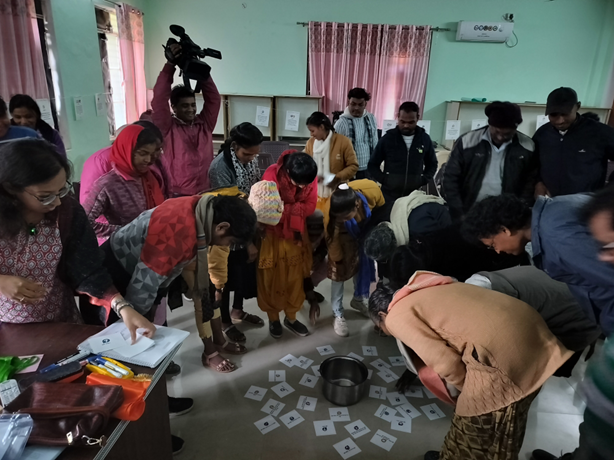
In session two, the participants specifically learnt about what constitutes forb through the story of The songs of the flute and the drum.
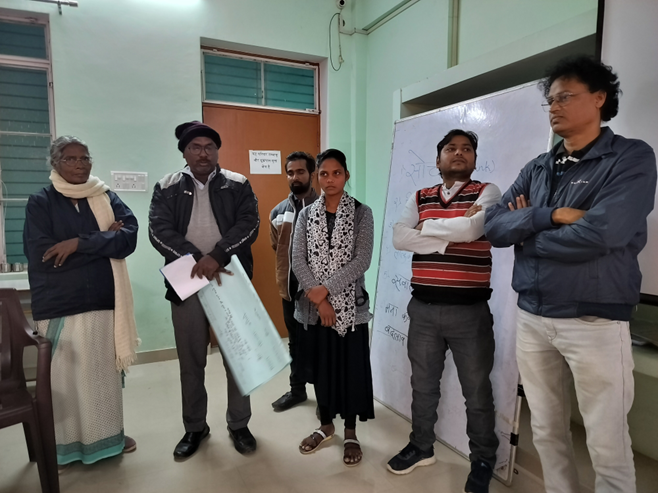
Session Three was very crucial as it elaborated on the idea that every individual had multiple identities based on their gender, caste, religion, region, language and race. In a society ridden with hierarchy, every identity has attached to itself to either a privilege or a disadvantage. The participants shared that the most of them experienced disadvantage due to their caste- they are perceived to belong to “lower castes”. The women also faced discrimination due to their gender identity.
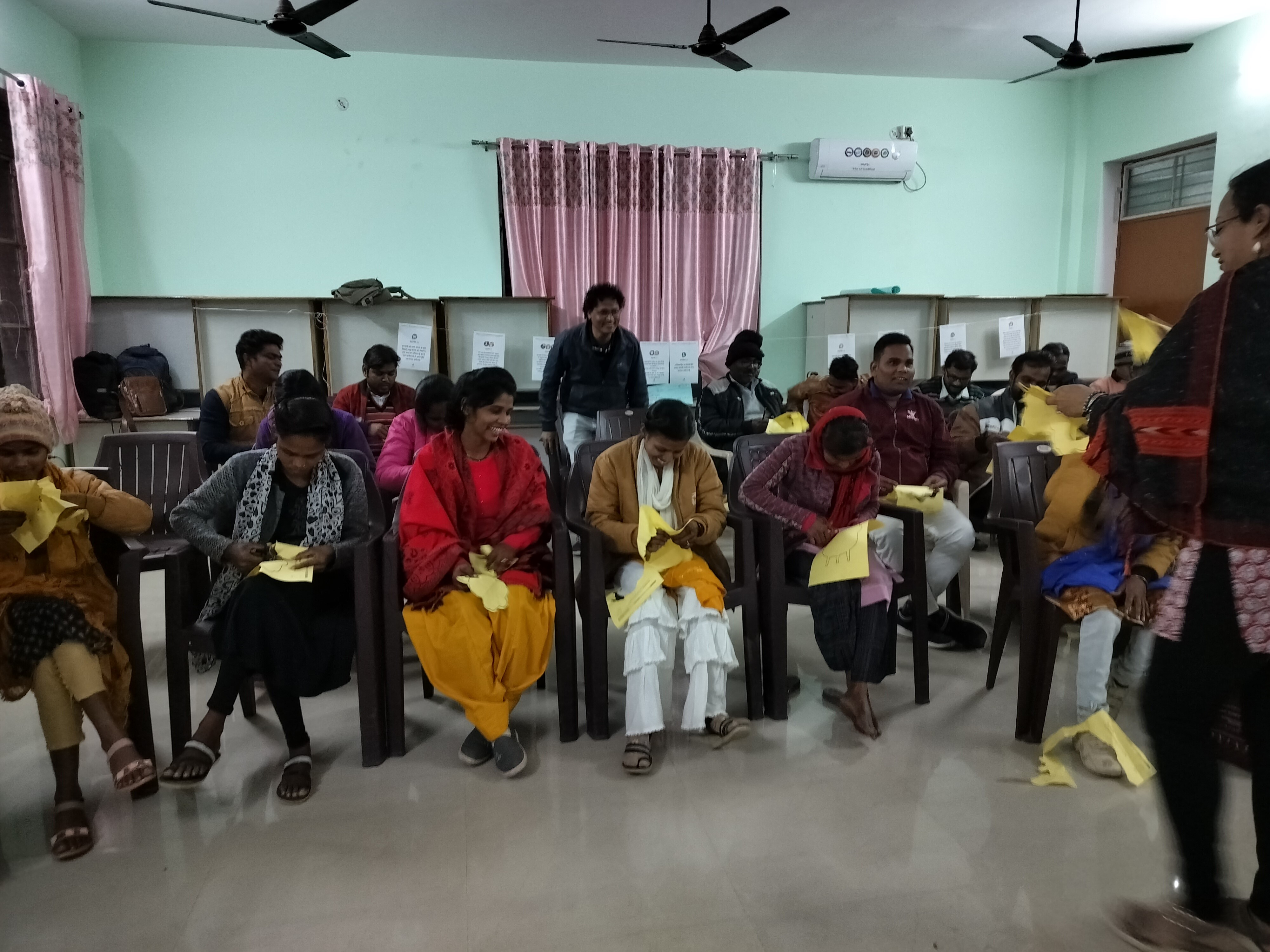
Session four explores violation of FORB and enables participants to practice identifying violations. This session introduces participants to different types of FORB violations and how people of all religions in different parts of the world are affected. It also strengthens participants’ ability to identify typical FORB violations they might encounter. In this session the participants could identity how violations of forb take place in places including homes, public spaces and schools based on caste and religion.
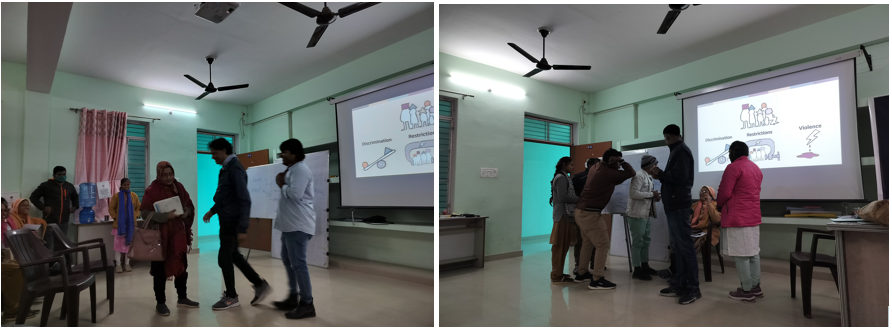
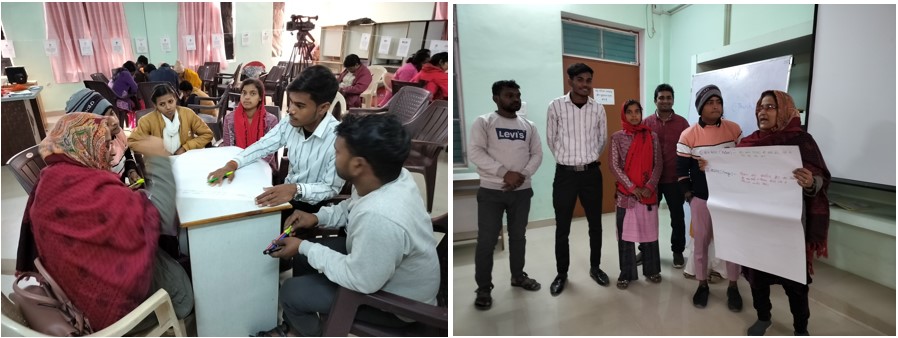
- Session five enables participants to develop their own FORB context analysis, identifying FORB related problems in their communities. This session focuses on building skills in context analysis. By the end of the session, participants were able to describe FORB related problems/violations faced by different people and groups in their community, identify how FORB violations affect women and girls in the community differently from men and boys, and empathize with people of other communities who are affected by FORB violations.
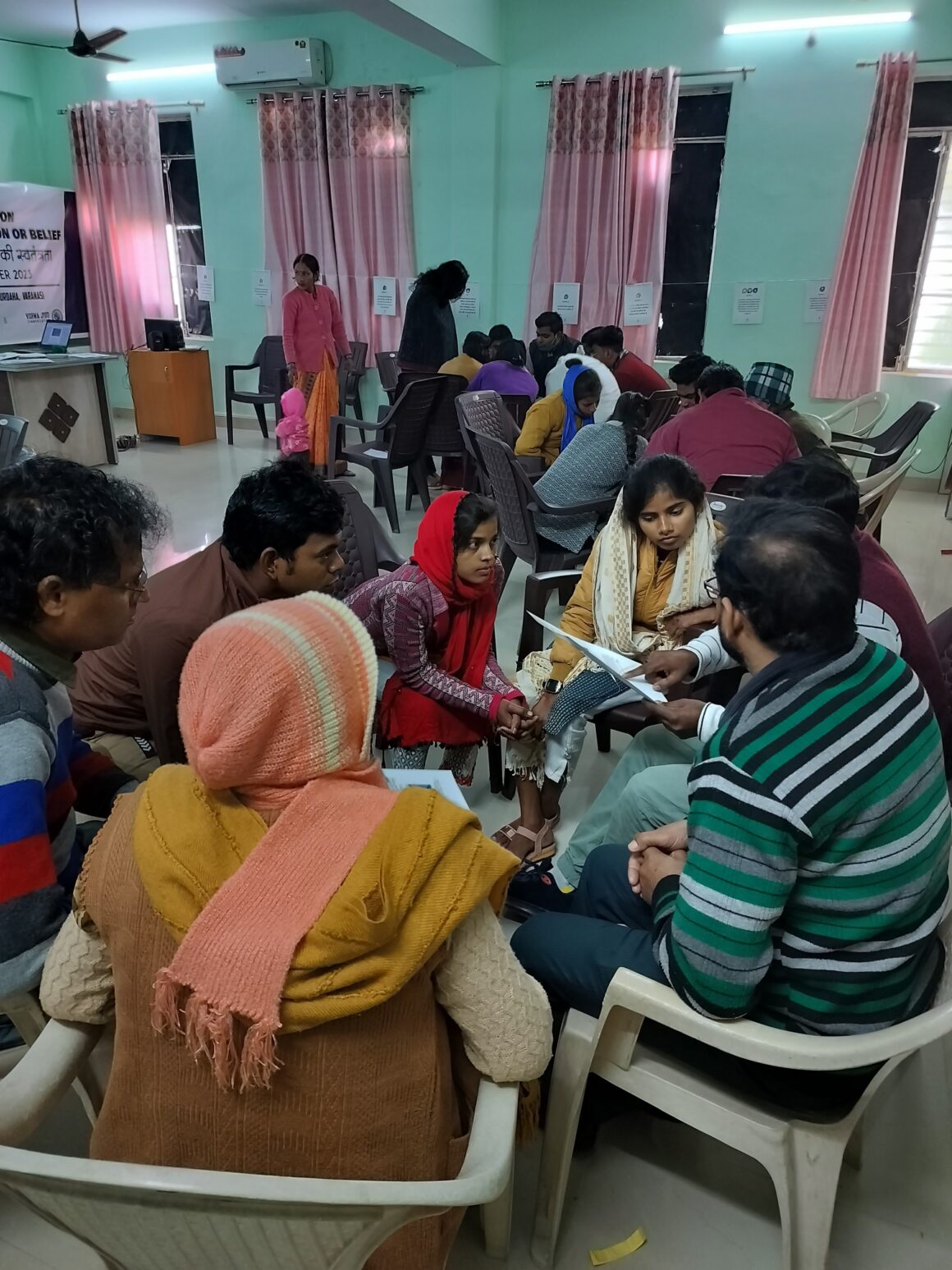
- Sessions 6 and 7 are ‘paired’ – with shared learning objectives and a single learning process.
Sessions 6 and 7 focus on developing knowledge regarding tactics for the promotion of human rights. By the end of these sessions, participants were able to give a simple explanation of the four different categories of tactics that can be used to promote human rights and give examples of actions for each type, express a desire to promote human rights in their community, have jointly identified at least five actions that they could take as individuals, and five actions that groups/organizations they are involved in could take, to promote FORB in their community.
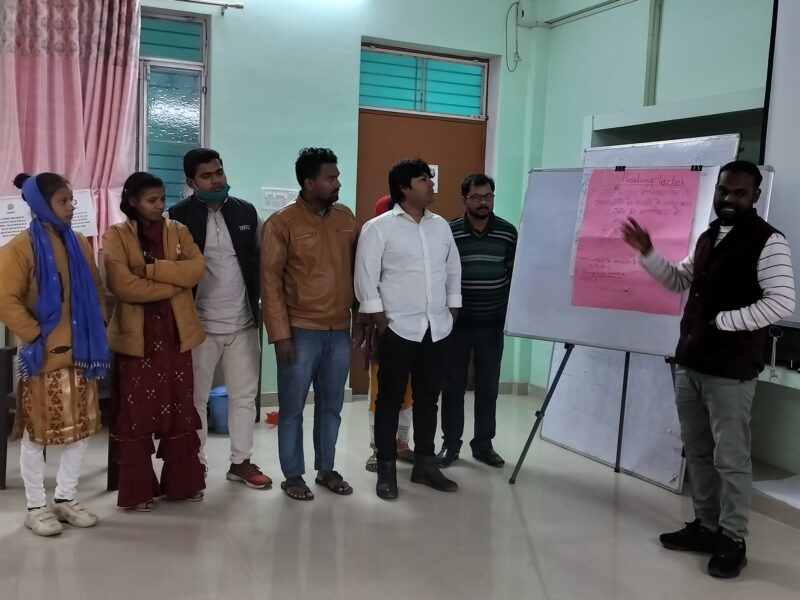
- Sessions 8–9 In these sessions, participants use the knowledge and the action ideas they developed in previous two sessions to develop an action plan in the form of a visual journey towards change. This session focuses on developing action planning skills. By the end of session 8 and 9 participants were able to, develop simple action plans for promoting FORB in the community, name concrete actions that they personally can take to promote FORB, express commitment to acting to promote FORB. Where relevant, participants will implement their action plans after the training.
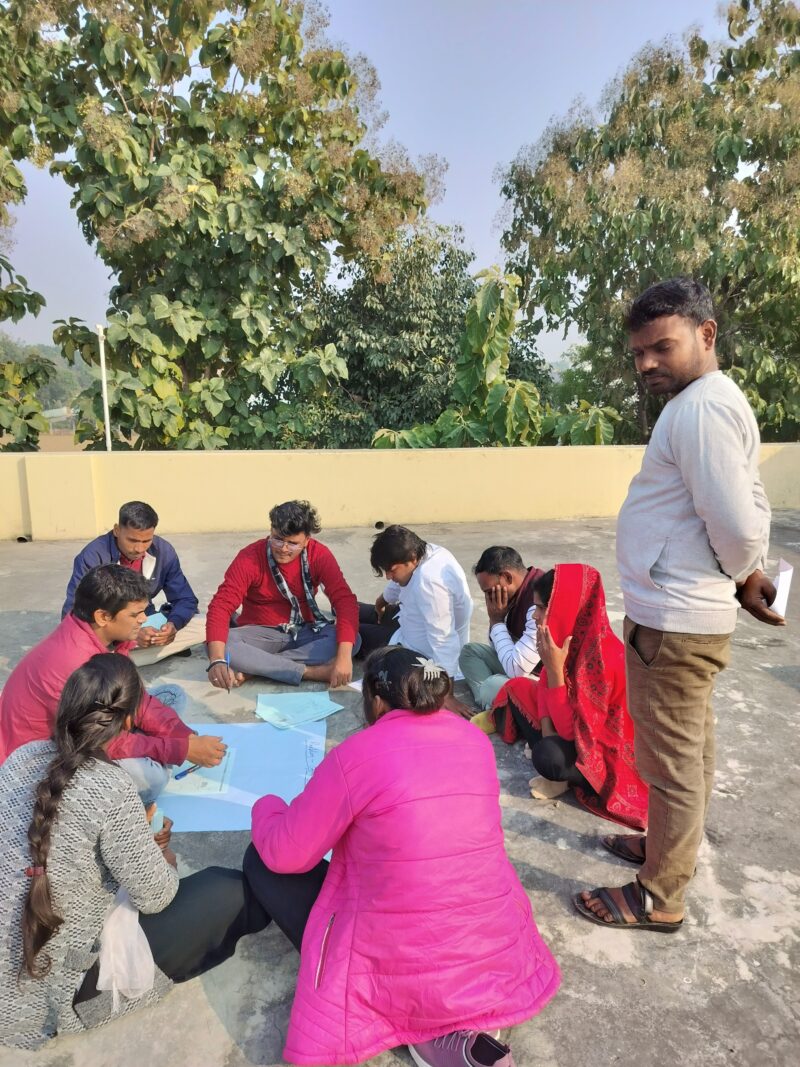
Participants made action plan to solve communal issues happening around them as part of the last activity so that they could apply some of the tactics they learnt to a concrete violation that takes place around them.
Action plan:
Group One
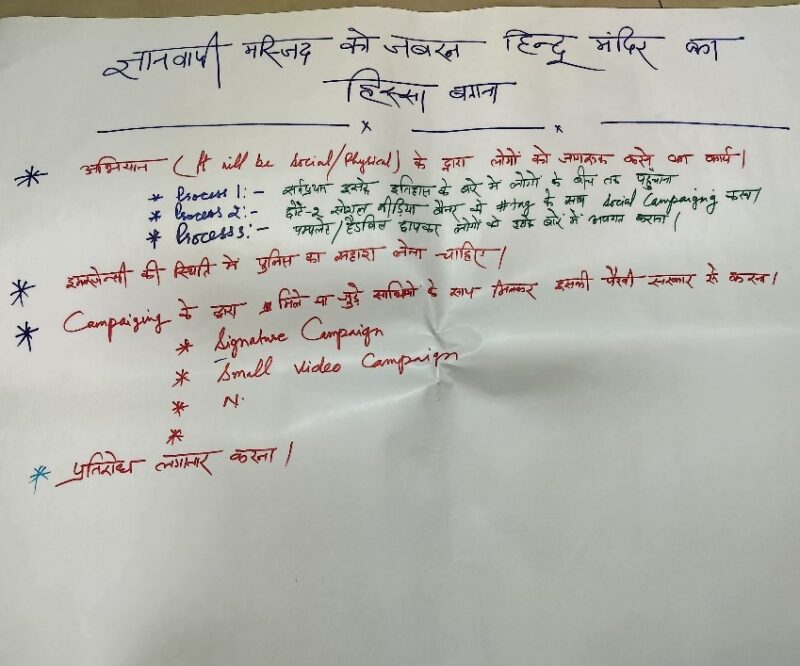
Group one had chosen to address the ongoing Gyanwapi issue which is fraught with tensions between Hindus and Muslims and the possibility of an attack on the Mosque by extremist Hindu organizations. As depicted in the poster above, participants expressed the necessity of spreading awareness about the history of the mosque to enlighten people about the truth. They aim to raise awareness through street plays, songs, and dramas, intending to highlight the significance of communal harmony in society.
Group Two
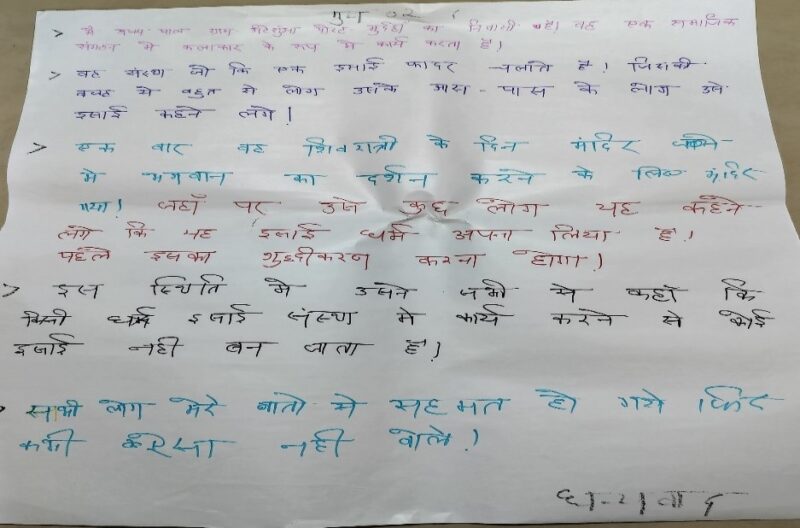
Ajay Pal, a participant from group two, shared a real-life incident he experienced. He recounted working with an organization whose director belongs to the Christian community. Misconceptions arose in the neighbourhood where he lived where it was assumed that Ajay had converted to Christianity and was not allowed entry into temples. The group also dealt with the larger issue of religious conversions and the harassment faced by the person who decides to change his/her own religion, especially in the context of unfounded allegations that Christian missionaries convert large number of people. This example prompted the entire group to commit to fostering understanding in similar situations.
Group Three
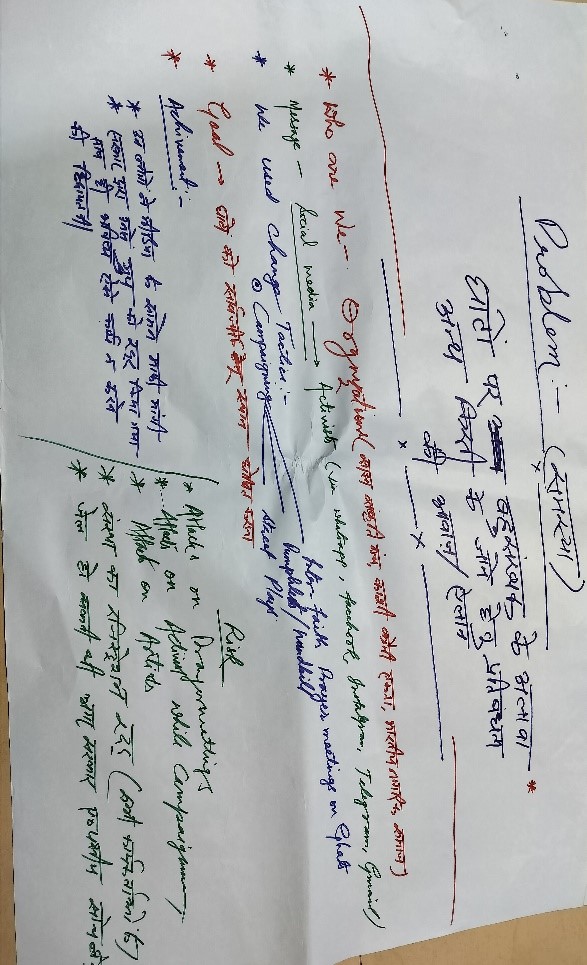
Group three recounted a situation where a group of right-wing activists prevented non- Hindu people from visiting the Ganga Ghat. This incident escalated into a major issue, leading to some participants to act against this discriminatory behavior. Eventually, the group of right wing activists realized their mistake and apologized, subsequently allowing all people, regardless of their background, to visit the Ganga Ghats. This example inspired the entire group to pledge their commitment to fostering understanding in similar situations.
Group Four
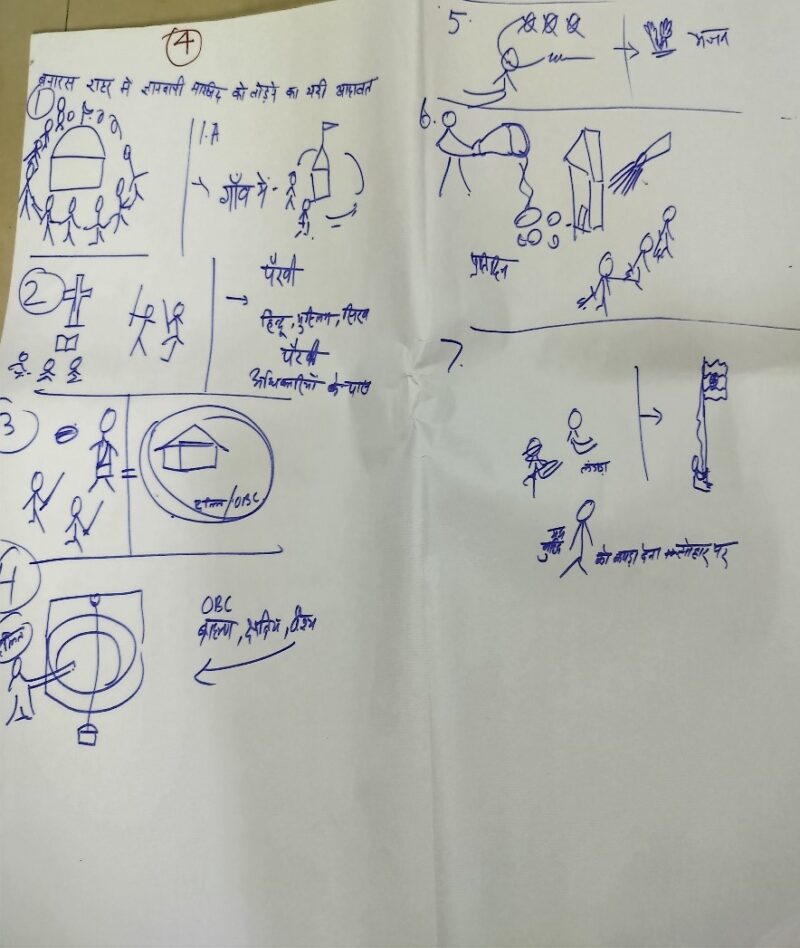
Group four revisited the Gyanwapi mosque issue, expressing concern over the potential for communal violence in Varanasi based on the ongoing situation. They pledged to actively oppose any violence that may arise. In the event of an attack on mosques, their plan involves mobilizing non-Muslims to form a protective chain around the mosque, preventing any potential attacks. Similarly, if there’s an attempted attack on a temple, they intend to gather non-Hindu individuals to form a protective barrier around the temple to thwart any violence.
Feedback:
Feedback highlighted the workshop’s success in providing practical tactics for addressing FORB violations, offering direction and skills for intervention. Initially harboring stereotypes against Muslims and Christians, participants evolved over the workshop, displaying openness and empathy towards all citizens, including those from different religious backgrounds. The workshop was well appreciated by participants as they saw the workshop as a rare opportunity to reflect on such sensitive issues. The participants despite their experiences of discrimination owing to caste and religion especially violence against Christians had a strong consciousness of religion- Hindu religion. Their views and attitudes were influenced by the dominant narratives and prevalent stereotypes against the Muslims and Christians. Most repeated stereotype was that Muslims were “kattar” or fanatic and they hate Hindus. One of the participants on the first day said, “Madam aap samaj nahi rahe ho. Ye Musalam bohot kattar hote hai. Inhe agar control mein nahi rakha toh ye Hinduon ko maar denge”. One other participant who shared examples of discrimination based on caste in his own life was visibly getting upset during the workshop when examples were shared of violations of forb of Muslims. He said to the trainer, “Madam aap Musalamon ke udharan mat do. Sachai kuch aur hai”. However, it was heartening to see that these very participants changed during the three days of the workshop. They were open to questioning and opened up their hearts to the violations of the all citizens including the Muslims.
The most heartening feedback was perhaps that the workshop provided them with tactics to deal with the violation of forb. “While as concerned citizens and civil society members, we are disturbed with the violations that take place around them, most of the times, we don’t know what we can do to intervene. But the four tactics elaborated in the workshop and the games/ exercises to understand them better will give us direction and skill to act in case of violation of forb”, said Gauri Shankar.
The women participants who had attended the workshop were feeling very overwhelmed. It was their first ever workshop and given the social norms, women are not allowed by their families and are not encouraged to attend residential workshops where they have to stay out of their houses overnight. But the women participants felt very encouraged after attending the workshop. They were glad for the opportunity to place forth their opinion in the training. They worked in groups and participated in teams where they are mostly voiceless at homes and society. This was a platform for them to raise their voices. All this was a noble experience for them.
“The methodology used in the workshop was so innovative that it kept me awake and engaged in the workshop. It gave me the opportunity to reflect on my many biases and stereotypes”, said Ajay Pal, one of the participants. For all the participants, it was their first workshop on the topic of forb. The participants shared that this was the first time they got the opportunity to reflect about what is meant by forb. They said though they were aware that freedom of religion was guaranteed under the Indian Constitution, they didn’t know what it actually meant in day to day life. “The workshop helped us to break down the meaning of forb as it unfolds in day to day life. I could understand through the workshop what is the violation of forb looks like in my society. This workshop will help me recognize the violation of forb when it happens around me”, said Savitri.
